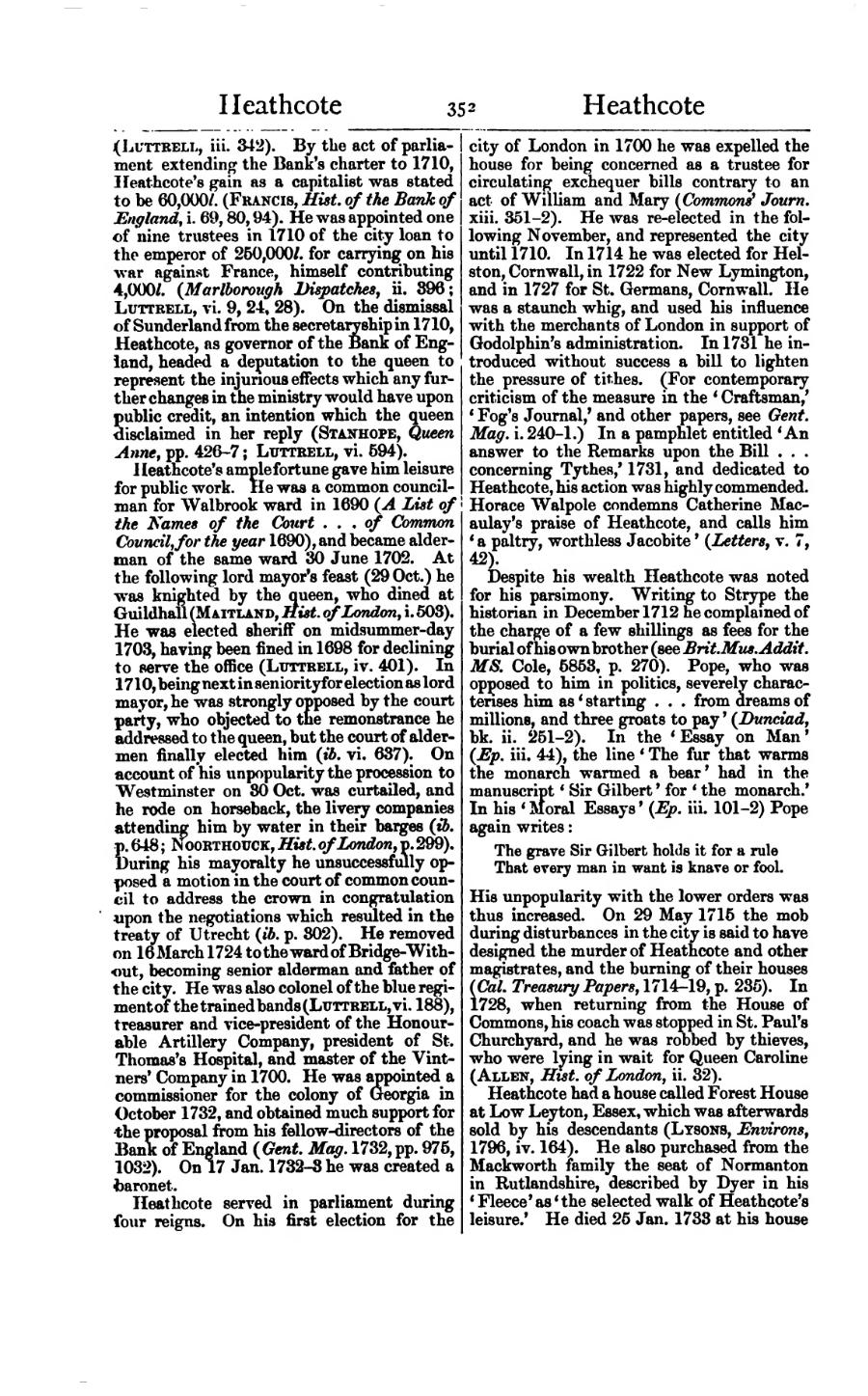(Luttrell, iii. 342). By the act of parliament extending the Bank's charter to 1710, Heathcote's gain as a capitalist was stated to be 60,000l. (Francis, Hist. of the Bank of England, i. 69, 80, 94). He was appointed one of nine trustees in 1710 of the city loan to the emperor of 250,000l. for carrying on his war against France, himself contributing 4,000l. (Marlborough Dispatches, ii. 396; Luttrell, vi. 9, 24, 28). On the dismissal of Sunderland from the secretaryship in 1710, Heathcote, as governor of the Bank of England, headed a deputation to the queen to represent the injurious effects which any further changes in the ministry would have upon public credit, an intention which the queen disclaimed in her reply (Stanhope, Queen Anne, pp. 426–7; Luttrell, vi. 594).
Heathcote's ample fortune gave him leisure for public work. He was a common councilman for Walbrook ward in 1690 (A List of the Names of the Court … of Common Council, for the year 1690), and became alderman of the same ward 30 June 1702. At the following lord mayor's feast (29 Oct.) he was knighted by the queen, who dined at Guildhall (Maitland, Hist. of London, i. 503). He was elected sheriff on midsummer-day 1703, having been fined in 1698 for declining to serve the office (Luttrell, iv. 401). In 1710, being next in seniority for election as lord mayor, he was strongly opposed by the court party, who objected to the remonstrance he addressed to the queen, but the court of aldermen finally elected him (ib. vi. 637). On account of his unpopularity the procession to Westminster on 30 Oct. was curtailed, and he rode on horseback, the livery companies attending him by water in their barges (ib. p. 648; Noorthouck, Hist. of London, p. 299). During his mayoralty he unsuccessfully opposed a motion in the court of common council to address the crown in congratulation upon the negotiations which resulted in the treaty of Utrecht (ib. p. 302). He removed on 16 March 1724 to the ward of Bridge-Without, becoming senior alderman and father of the city. He was also colonel of the blue regiment of the trained bands (Luttrell, vi. 188), treasurer and vice-president of the Honourable Artillery Company, president of St. Thomas's Hospital, and master of the Vintners' Company in 1700. He was appointed a commissioner for the colony of Georgia in October 1732, and obtained much support for the proposal from his fellow-directors of the Bank of England (Gent. Mag. 1732, pp. 975, 1032). On 17 Jan. 1732–3 he was created a baronet.
Heathcote served in parliament during four reigns. On his first election for the city of London in 1700 he was expelled the house for being concerned as a trustee for circulating exchequer bills contrary to an act of William and Mary (Commons' Journ. xiii. 351–2). He was re-elected in the following November, and represented the city until 1710. In 1714 he was elected for Helston, Cornwall, in 1722 for New Lymington, and in 1727 for St. Germans, Cornwall. He was a staunch whig, and used his influence with the merchants of London in support of Godolphin's administration. In 1731 he introduced without success a bill to lighten the pressure of tithes. (For contemporary criticism of the measure in the ‘Craftsman,’ ‘Fog's Journal,’ and other papers, see Gent. Mag. i. 240–1.) In a pamphlet entitled ‘An answer to the Remarks upon the Bill … concerning Tythes,’ 1731, and dedicated to Heathcote, his action was highly commended. Horace Walpole condemns Catherine Macaulay's praise of Heathcote, and calls him ‘a paltry, worthless Jacobite’ (Letters, v. 7, 42).
Despite his wealth Heathcote was noted for his parsimony. Writing to Strype the historian in December 1712 he complained of the charge of a few shillings as fees for the burial of his own brother (see Brit. Mus. Addit. MS. Cole, 5853, p. 270). Pope, who was opposed to him in politics, severely characterises him as ‘starting … from dreams of millions, and three groats to pay’ (Dunciad, bk. ii. 251–2). In the ‘Essay on Man’ (Ep. iii. 44), the line ‘The fur that warms the monarch warmed a bear’ had in the manuscript ‘Sir Gilbert’ for ‘the monarch.’ In his ‘Moral Essays’ (Ep. iii. 101–2) Pope again writes:
The grave Sir Gilbert holds it for a rule
That every man in want is knave or fool.
His unpopularity with the lower orders was thus increased. On 29 May 1715 the mob during disturbances in the city is said to have designed the murder of Heathcote and other magistrates, and the burning of their houses (Cal. Treasury Papers, 1714–19, p. 235). In 1728, when returning from the House of Commons, his coach was stopped in St. Paul's Churchyard, and he was robbed by thieves, who were lying in wait for Queen Caroline (Allen, Hist. of London, ii. 32).
Heathcote had a house called Forest House at Low Leyton, Essex, which was afterwards sold by his descendants (Lysons, Environs, 1796, iv. 164). He also purchased from the Mackworth family the seat of Normanton in Rutlandshire, described by Dyer in his ‘Fleece’ as ‘the selected walk of Heathcote's leisure.’ He died 25 Jan. 1733 at his house
